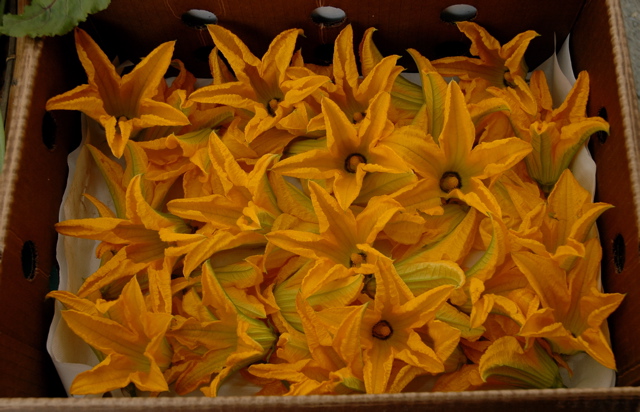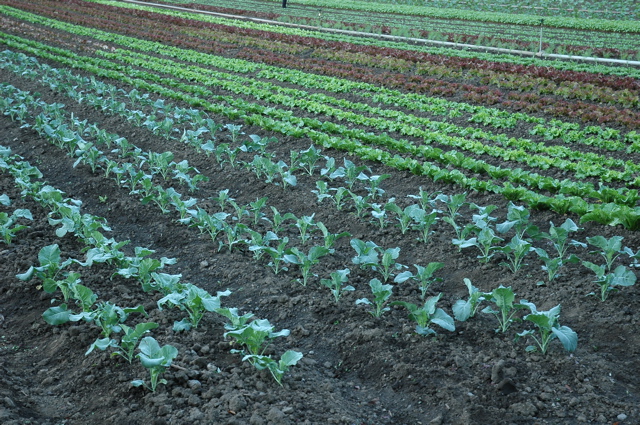 Photo:Annie Spiegelman
Photo:Annie Spiegelman
Cheap food is great, and we have to acknowledge that achievement, but we also have to acknowledge the cost of it. If you understand what it takes to make food cheap, you lose your appetite.
-Michael Pollan, speaking last month on the Oprah Show
For the past twenty-five years, Michael Pollan has been writing books and articles about the places where nature and culture intersect: on our plates, in our farms and gardens, and in the human-developed environment. He is the author of four New York Times bestsellers: Food Rules: An Eater's Manual; In Defense of Food: An Eater's Manifesto; The Omnivore's Dilemma: A Natural History of Four Meals and The Botany of Desire: A Plant's-Eye View of the World. He's on tour now speaking about The Sun Food Agenda, an inspiring multimedia presentation, connecting the dots between food and health (personal as well as environmental), and introducing some of the visionaries who are "resolarizing" the food system. I spoke with him by phone to ask him why he's got his knickers in a twist about the high rates of the so-called Western diseases: obesity, Type 2 diabetes, cardiovascular disease and cancer, and why he says we shouldn't eat 'food' from gas stations. You're not the boss of me Pollan! As soon as I finish this interview I'm off to 7-Eleven for a Purple-for-the-People Slurpee. (Just kidding.)
You write that we should, "Eat food, not too much and mostly plants." Say what? But the American mantra is, "Eat food-like substances, as much as you can, mostly burgers." How do we encourage Americans to change dietary course?
I think that as a writer you do it by making food seem as appealing as possible and that it doesn't involve sacrifice. That it's about pleasure. The hard part is the 'not too much' part. I try to get them to think about quality instead of quantity. There is a trade off. It's more satisfying to eat less of more high quality foods than eat more of low quality foods. It's how cultural change always happens; by storytelling. I try to lead with pleasure instead of finger pointing or lecturing. You lead by putting really good food and good stories in front of people. Then you have a chance of getting them to move on their own instead of changing because a doctor is telling them to eat better or they're going to die. That's not for me to do.
You've said that, "When we eat a McDonald's hamburger, we're really eating a lot of oil, not only fat, but petroleum." After the beef industry crucified Oprah, aren't you afraid to talk about meat?
Then I'll talk about the sun. (Laughing.) The Sun Food Agenda is my shorthand for a vision of how to reshape the American food system around the values of health and sustainability. A more sustainable food system will be healthier and more diversified. We'll use less fossil fuel and we'll eat more fresh food instead of processed food. As I see it, if you stand back far enough, one of the big problems with American agriculture is that it is has replaced the energy of the sun with fuel. That's how we've made this extremely productive monoculture. It gives us the fossil fuel fertilizer, the equipment, the worldwide shipping, and the tools to process things into edible food-like substances. But we can't count on using 20% of our fossil fuel to feed ourselves, not in a system that is solar based to begin with. We need to get back to the sun. How do you do that? It's a journey. It's been a journey for me learning about this issue. I've met some of the pioneering visionaries who I talk about in the Sun Food Agendapresentation.
Soil Scientist, Stephen Andrews at UC Berkeley says the word of our time is not plastic but microbes. Organic farmers nourish the microbial life in the soil which then feeds the crops; instead of crack-feeding plants with chemicals. Less than 5 percent of farms nationally are operated organically, yet in Marin County, California, where I live, we have 52 organic farms producing fruits and vegetables on a large scale. How do we persuade conventional farmers to get on the 'compost and mulch' love train?
Having organic farmers who make it work and make a profit is the most eloquent statement to other farmers. We're starting to see that happen but we also need policy changes at the federal level. Right now the system is rigged in favor of fossil fuel agriculture. We give subsidies to the biggest monocultures; soy, corn, wheat. We need to reconfigure the incentive to make it friendlier to small-scale, diversified farmers. It's going to take change at every level, including the consumer. We need to encourage people to vote with their fork, like they do in Marin.
 Green Gulch Organic Farm, California. Photo: Annie Spiegelman
Green Gulch Organic Farm, California. Photo: Annie Spiegelman
"Cooking for yourself," you write, "is the only sure way to take back control of your diet from the food scientists and food processors." My favorite cookbooks, lately, are Jessie Ziff Cool's Simply Organic and Organic Marin: Recipes from Land to Table edited by Tim Porter. What are some cookbooks you're using these days?
David Tanis, chef at Chez Panisse, I like his books, especially Heart of the Artichoke and Other Kitchen Journeys. Mark Bittman's books I find really accessible. Judy Rogers's The Zuni Café Book is excellent, and lately I've been cooking bread out of the Tartine Bread cookbook by Chad Robertson.
A scientific report by the UN came out last month stating that Agroecological farming methods-the concept of applying agro-ecological principles to the food production of food- outperform the use of chemical fertilizers in boosting food production. Should the earthworms start partying like rock stars?
It is happening. Marin may have been ahead of the curve and so has the West Coast in general but I see it happening around the country when I do public speaking. There is still a long way to go. The movement is still in its infancy but the fact that this economic recession hasn't destroyed organic food, is a very good sign. It could have if 'organic' were merely a luxury. Organic sales are up even in this tough economy. Consumers could have given up purchasing organic milk and they haven't. That suggests this issue has legs.
The U.S. is rated number one in childhood obesity. How about people who don't like kids. Why should they care?
Obesity is one issue but health is a bigger issue than obesity. And we all need to care. Eating well is its own reward in many ways. Health is about feeling good. There are a great deal of chronic diseases linked to diet. When you talk to people who have gotten off of the fast food diet, off of the carbohydrate treadmill, less white flour and sugar, they feel better and that's what keeps them eating real food. The satisfactions of junk foods are really fleeting. The satisfaction from real food is more durable. One of my rules for kids and for adults is to break the rules every once in awhile. The key is to have 'special occasion' foods. That phrase should tell you all you need to know. They're not foods to eat everyday.
I recently interviewed Justin Beiber. He said he liked to chill in his down time and eat Doritos. What is your snack food when you chill with your homies?
When I was his age I liked Doritos too. We all go through our stages. My own personal food when I break the rule is pizza. Not that it's necessarily unhealthy. I'll have whole wheat pizza. I also like nuts a lot. I don't enjoy potato chips as much as I used to. They're super salty so I've lost my taste for them but if I'm watching TV and eating mindlessly I would probably choose nuts.
I also asked him when he was going to cut his hair.
I don't have any hair to cut so that's not as pressing an issue, as it may be to Justin. (Laughing.)
You live in the Bay Area but you're originally from the East Coast. Has working in your garden made you less of a cynical New Yorker?
For me gardening is therapeutic, it's also the source of the freshest food I get to eat and it's also beautiful. To me it's more beautiful than a perennial border. The satisfaction for me is gustatory as well as aesthetic and therapeutic. You know what? (Laughing) Even when I was a cynical New Yorker, I loved to garden and I've gardened for a long time, so I'm not sure its quite the antidote.